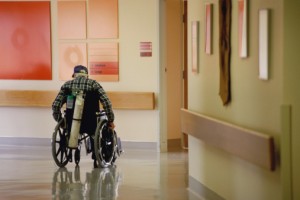 According to statistics from The American Association for Justice, a shocking 90 percent of nursing homes in the United States do not employ a sufficient number of qualified care professionals to provide an acceptable level of care for their residents. In addition, it is estimated that approximately 93 percent of all instances of abuse and neglect within nursing homes go unreported each year. These numbers serve to further support the need for more consistent regulations, improved monitoring and more stringently enforced legal repercussions for neglectful and abusive nursing home staff.
According to statistics from The American Association for Justice, a shocking 90 percent of nursing homes in the United States do not employ a sufficient number of qualified care professionals to provide an acceptable level of care for their residents. In addition, it is estimated that approximately 93 percent of all instances of abuse and neglect within nursing homes go unreported each year. These numbers serve to further support the need for more consistent regulations, improved monitoring and more stringently enforced legal repercussions for neglectful and abusive nursing home staff.
What Constitutes Nursing Home Neglect?
When many people consider the notion of neglect in a nursing home, they typically think of failure to address residents’ pain or cries for help, forgetfulness regarding medications, or simple disregard for residents’ well being in general. While these are certainly significant causes for concern, the issues that plague the nursing home industry are far more numerous and, in many cases, even more serious.
HelpGuide.org reports that negligence accounts for “more than half” of abuse cases reported in nursing homes in the United States. Negligence encompasses all forms of elder abuse that are determined to be the result of intentional or passive abandonment of duty regarding care. When a nursing home staff member intentionally denies a resident adequate care for any reason whatsoever, that resident has claim to compensation for negligence. If, for example, a nursing home patient’s condition or conditions become noticeably worse due to a lack of proper care, that patient and his or her family is entitled to their inalienable right to justice. If, however, no official complaint or report of negligence is filed, victims and their loved ones are left to endure the circumstances without assistance.
Signs of Nursing Home Neglect and Elder Abuse
Neglect and abuse that takes place within a nursing home setting can take many forms. Even if the victim of the abusive behavior is not able to speak up and make a stand against his or her caregivers, concerned family members can take steps to correcting the situation through careful observation and consistent monitoring of activity that occurs.
Some of the most common forms of elderly neglect in nursing home facilities include the following:
- Isolation – In order to punish a resident for any action that the staff sees as undesirable, inhumane acts of isolation have occurred. This includes keeping the elderly resident locked within his or her small room away from other residents, even during community hours. The emotional and mental toll that this can have on an elderly person can prove extremely serious and detrimental to overall health.
- Ignoring – Ignoring the emotional and physical health needs of a resident can include everything from simply pretending the individual does not exist, even while the staff member is present in the room, to choosing to forgo medication dosages and changing of linens or clothing.
- Emotional Abuse – During a period in their lives in which they are away from family and friends for the majority of the time, elderly residents in nursing homes require regular interaction, conversation and emotional stimulation in order to stay happy and healthy in their later years. Staff members who consistently speak in harsh tones or with profane language to their charges can cause significant psychological damage over time, leading to a potential decline in health in their residents.
Family members who notice signs of abuse in their elderly relatives are advised to report any suspicious activity immediately and to seek out legal counsel in order to determine an effective course of action that aims to solve the problem and repair any damage sustained.
Hughes & Coleman is nursing home neglect and injury law firm located in Kentucky. For more information, please visit www.nursinghomeneglectlawyers.com.
